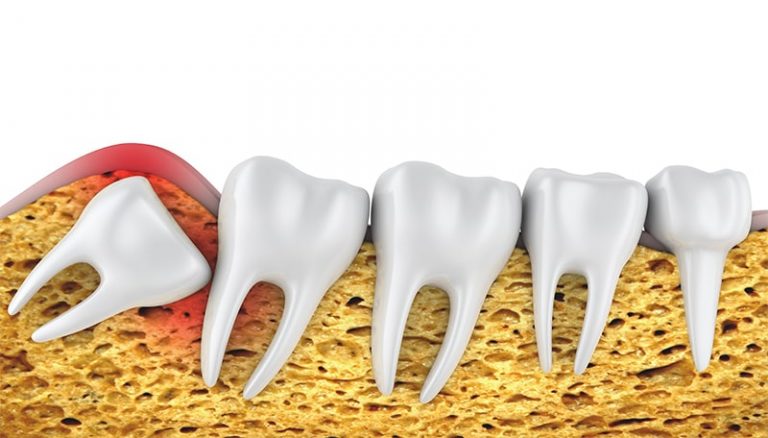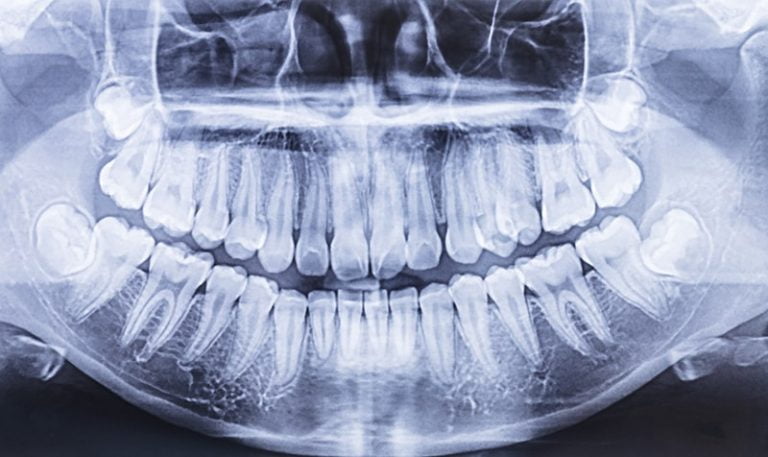The third molars (M3s) at the back of the mouth are the wisdom teeth. As they appear later than the other teeth, at an age that people are wiser than children, they are called wisdom teeth. They mostly erupt between the ages of 17 and 25 years. Totally, there are four wisdom teeth, two on the bottom and two on top. Not everyone has wisdom teeth, and some have more than four!
If your wisdom teeth do not fully emerge or misaligned, they are called impacted wisdom teeth. Generally, the wisdom teeth become impacted due to some reasons, including heredity, childhood diseases, anemia and rickets, and a mismatch between the size of the jaw and teeth.
The impacted wisdom teeth should be removed to prevent pain, damaging the neighboring teeth and jawbone, bacterial growth, infection, tumor, cyst, gum disease, and so on.

What Are the Wisdom Teeth for?
According to Columbia College of Dental Medicine, “Our prehistoric forebears had larger, stronger jaws—the better to chew the tough foods they ate, like raw meats and plants. Our modern diet doesn’t require such forceful chewing… Today, our better dental health and smaller jaws mean that there’s less room for wisdom teeth, so they are more likely to cause problems.”
Therefore, due to our ancestors’ diet, their skulls were lager with more teeth, including wisdom teeth. They could improve their eating ability.
In What Cases the Wisdom Tooth Must Be Removed?
Our emergency dentist will extract the wisdom tooth or remove it surgically if they:
– Cause infection or periodontal disease
– Are impacted
– Cause pain
– Crowd other teeth
– Cause swelling
– Lead to tooth decay or cavities that cannot be restored

How Is the Wisdom Tooth Extracted?
After anesthesia injection, if the wisdom tooth fully erupts and the crown of the tooth is visible, it will be extracted. However, impacted wisdom teeth are surgically removed in walk-in emergency dental clinic. Wisdom teeth extraction is easier in young people because the bone is less dense, and the roots are not fully developed.
According to College Dental Group and Orthodontics, “Surgery to remove wisdom teeth is typically the best course of action. If a wisdom tooth has fully erupted through the gum, a standard tooth extraction is performed. If the tooth has not erupted through the gum, an impacted tooth extraction method is used.”
Preparation for Surgery
You may need to take a few days off from work or school to have enough time to rest. A good night’s rest before the surgery is essential. Keep calm, and if you are anxious, consult the emergency dentist.
Be sure that you will not suffer from any pain during the surgery process. According to the Dental Clinic Toronto, “In simple cases, local anesthesia is administered at the side of wisdom teeth extraction after numbing the area via a numbing gel. You will remain awake during the whole procedure. On the other hand, in some cases, sedation anesthesia or general anesthesia can be administered wherein you will remain asleep during the procedure and will thus not feel any pain.”
The procedure may take half an hour. The emergency dentist opens up the gum tissue that is over the wisdom tooth. Then he removes any bone that covers the tooth. In some cases, he cuts the wisdom tooth into smaller pieces to remove it easier. Sutures are used to close incisions and repair the cuts.
After Surgery
The emergency dentist will prescribe painkillers and antibiotics if necessary. You should restrict your activity for the next few days. You may feel discomfort until the hole is completely healed. Here are some guidelines that help you to speed up the healing process:
– Avoid touching the area of surgery.
– Place a cold compress on your face to prevent swelling or discoloration of the skin.
– Slowly open and close your mouth.
– Eat soft foods, including pasta or soup.
– Drink plenty of fluids.
– The day after surgery, you can brush your teeth.
– Be sure to take the prescribed medications to relieve pain or swelling.
– Contact Walk-in Dental Clinic if you have a fever, severe pain, or swelling.
– Do not rinse your mouth too vigorously.
– Do not smoke because smoking slows the healing process.
